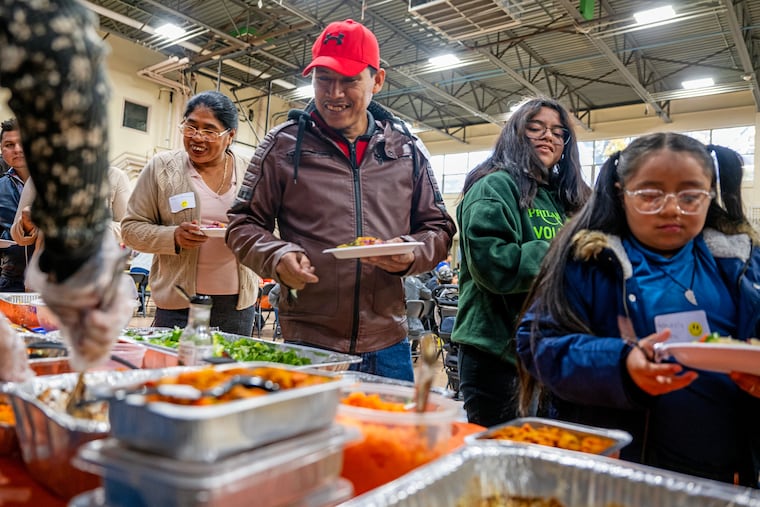Immigrants in Philly celebrate Thanksgiving, amid anxiety about Trump: ‘We hope that he doesn’t do much that he says’
The dinner was hosted by HIAS Pennsylvania, an immigrant services and refugee resettlement agency. In the wake of Donald Trump’s reelection, clients are "sad and afraid," its leader said.

Antonio Garcia has been content with his life in Philadelphia since emigrating from El Salvador six years ago. A maintenance worker for an apartment complex, Garcia lives with his wife and three children in Northeast Philadelphia, in a neighborhood with “so many cultures.”
But Garcia — who left El Salvador in part to find better educational opportunities for his daughter, who has Down syndrome — is newly worried about his prospects.
“We are nervous about Trump,” Garcia said. “We hope that he doesn’t do much that he says.”
Garcia and his family were among more than 100 people who took part in a Thanksgiving dinner at the Old Pine Community Center in Society Hill on Sunday hosted by HIAS Pennsylvania, an immigrant services and refugee resettlement agency. In the wake of Donald Trump’s reelection — after a campaign season featuring dark rhetoric about immigrants and promises of mass deportations — there was a current of anxiety underlying the event.
HIAS Pennsylvania’s executive director, Cathryn Miller-Wilson, said in an interview that many of the agency’s clients were “sad and afraid” after the election — grappling with the question, “What does it mean to be in a country hostile to me?”
The agency served 6,000 people last year, the vast majority immigrants seeking legal services. Miller-Wilson said she’d sought to assure them that, despite the “victory for anti-immigrant sentiments,” Trump’s election was driven primarily by economic concerns, and “not about hate.” (Miller-Wilson, however, argued that an immigration crackdown wouldn’t be an economic boon, but a “disaster.”)
While HIAS Pennsylvania briefly considered canceling Sunday’s “Thankful Together” event — which it hosts every Thanksgiving — it decided “absolutely not,” Miller-Wilson said. “We really have to show clients, we’re still here for you.”
For Sunday’s dinner, folding tables were set up across the basketball court inside the community center, draped with red and yellow plastic tablecloths. Volunteers stationed near the walls scooped turkey, stuffing, and corn bread out of foil trays, as clients lined up with plates. Children ran around with pages from coloring books.
“We know most of you are anxious about the future, and so are we,” Miller-Wilson told the crowd, which included people from an array of countries; interpreters were on hand to translate in Spanish, Pashto, Rohingya, and Dari. But “the future will be better because you are here sharing the present with us.”
The message was echoed by several Democratic officials who also addressed the gathering, including U.S. Rep. Mary Gay Scanlon, who told attendees she understood “how important it is we remain a welcoming country” and thanked them for being here.
City Councilmember Jamie Gauthier said her mother had immigrated to Philadelphia from the Caribbean as a teenager, with “the same determination and hopes that you all have.”
While “I know we are in uncertain, tense times,” she said, “Philadelphia City Council welcomes you.”
Israel Hernandez was among those at the dinner confronting that uncertainty. Hernandez came to the United States from Guatemala six years ago; through an interpreter, he said he left with his son because his son was having problems with drugs, and Hernandez feared he would be killed.
His 17-year-old daughter, Carmen, joined her father in Philadelphia in April. But another daughter is still in Guatemala, and Hernandez fears she will no longer be able to come.
While Hernandez said he wasn’t going to worry about his fate under Trump, he “can’t stop thinking” about his daughter. He doesn’t want her to be alone, but also doesn’t want to return to Guatemala, given the problems that drove him to immigrate.
Some attendees of the dinner said they were not paying close attention to the election or dwelling on the results. Paulino Dikuiza, who came to the U.S. from Angola five years ago, said he left his home country because of his political activism there. Here, “I am not political,” he said in French.
Mashal Ahmadzai, an immigrant from Afghanistan who came to Philadelphia with his family a year ago, said that as a green card holder, he was unconcerned. “We have documents,” said Ahmadzai, who works as a forklift driver. He felt there was little “risk for us.”
During his six years in Philadelphia, Garcia, the El Salvador native, said he hasn’t had any problems. His older son, 13-year-old Dylan, said he and his 11-year-old sister were happy to join their parents in Philadelphia four years ago; upon moving here, his parents had a third child.
“There are a lot of families here,” Antonio Garcia said. “We work hard and contribute.”